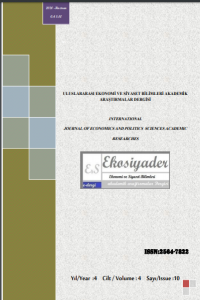GOING GREEN - INDUSTRY 5.0, SUPPLY CHAIN AND DEMANDING CUSTOMER
Industry 5.0 differs from the former industrial revolutions with a high propensity to human orientation. Sustainability and resilience are the key salient instruments of this emergent process. Besides, there is a growing interest in sustainable and green products. The main purpose of this study is to provide a common green ground for supply chains and consumption within the scope of Industry 5.0. Besides, another aim is to present an integrated theoretical framework of Industry 5.0, green supply chain, and green consumption to guide future studies. Advancements in technologies of manufacturing systems can support greening actions regarding supply chains and, in turn, customer satisfaction. This study contributes to the existing literature by examining the connections among Industry 5.0 specific technologies and its philosophy, greening supply chains, and consumption. Results reveal that new Industrial revolution dynamics benefit green implications of supply chains and lead to increased customer satisfaction. The findings of the paper are presented as a conceptual model to guide future research.
Anahtar Kelimeler:
Green Supply Chain, Green Consumption, Sustainability, Resilience, Industry 5.0.
GOING GREEN - INDUSTRY 5.0, SUPPLY CHAIN AND DEMANDING CUSTOMER
Industry 5.0 differs from the former industrial revolutions with a high propensity to human orientation. Sustainability and resilience are the key salient instruments of this emergent process. Besides, there is a growing interest in sustainable and green products. The main purpose of this study is to provide a common green ground for supply chains and consumption within the scope of Industry 5.0. Besides, another aim is to present an integrated theoretical framework of Industry 5.0, green supply chain, and green consumption to guide future studies. Advancements in technologies of manufacturing systems can support greening actions regarding supply chains and, in turn, customer satisfaction. This study contributes to the existing literature by examining the connections among Industry 5.0 specific technologies and its philosophy, greening supply chains, and consumption. Results reveal that new Industrial revolution dynamics benefit green implications of supply chains and lead to increased customer satisfaction. The findings of the paper are presented as a conceptual model to guide future research.
Keywords:
Green Supply Chain, Green Consumption, Sustainability, Resilience, Industry 5.0.,
___
- Ahi, P., & Searcy, C. (2013). A comparative literature analysis of definitions for green and sustainable supply chain management. Journal of Clean Production. 52:329–341. https://doi.org/10.1016/j.jclepro.2013.02.018.
- American Marketing Association, Marketing Dictionary, https://marketing-dictionary.org/. Bey, C. (2001). Quo vadis industrial ecology. Greener Management International, 34(34), 35-42.
- Climate Action, WWF. (2021). Huge rise in demand for sustainable goods during pandemic, https://www.climateaction.org/news/wwf-huge-rise-in-demand-for-sustainable-goods-during-pandemic.
- Country Living. (2020). City-dwellers wanting to move out to a village are up 126% due to the pandemic. https://www.countryliving.com/uk/wildlife/countryside/a33530319/city-dwellers-move-countryside-pandemic/,
- Danso, A., Adomako, S., Amankwah‐Amoah, J., Owusu‐Agyei, S., & Konadu, R. (2019). Environmental sustainability orientation, competitive strategy and financial performance. Business Strategy and the Environment, 28(5), 885-895.
- Demir, K. A., Döven, G., & Sezen, B. (2019). Industry 5.0 and human-robot co-working. Procedia Computer Science, 158, 688-695.
- de Sousa Jabbour, A. B. L., Jabbour, C. J. C., Godinho Filho, M., & Roubaud, D. (2018). Industry 4.0 and the circular economy: a proposed research agenda and original roadmap for sustainable operations. Annals of Operations Research, 270(1), 273-286.
- Draganov, M., Panicharova, M., & Madzhirova, N. (2018, June). Marketing 5.0. Transactions of artificial intelligence systems in the digital environment. In 2018 International Conference on High Technology for Sustainable Development (HiTech) (pp. 1-3). IEEE.
- European Comission (2021). Environment- Facts and Figures, https://ec.europa.eu/environment/eussd/smgp/facts_and_figures_en.htm.
- Fasan, M., Soerger Zaro, E., Soerger Zaro, C., Porco, B., & Tiscini, R. (2021). An empirical analysis: Did green supply chain management alleviate the effects of COVID‐19?. Business Strategy and the Environment.
- Guide Jr, V. D. R., Jayaraman, V., Srivastava, R., & Benton, W. C. (2000). Supply-chain management for recoverable manufacturing systems. Interfaces, 30(3), 125-142.
- Hart, S. L. (1997). Beyond greening: strategies for a sustainable world. Harvard business review, 75(1), 66-77.
- Jemai, J., Do Chung, B., & Sarkar, B. (2020). Environmental effect for a complex green supply-chain management to control waste: A sustainable approach. Journal of Cleaner Production, 277, 122919.
- ISSN: 2564-7822
- Başlangıç: 2017
- Yayıncı: Şahin ÇETİNKAYA
Sayıdaki Diğer Makaleler
GİRİŞİMCİLİK- İNOVASYON VE İKTİSADİ BÜYÜME ARASINDAKİ İLİŞKİ: TÜRKİYE İÇİN AMPİRİK BİR TAHMİN
GOING GREEN - INDUSTRY 5.0, SUPPLY CHAIN AND DEMANDING CUSTOMER
SAĞLIK HARCAMALARININ HASTA MEMNUNİYETİ VE YAŞAM SÜRESİ İLE İLİŞKİSİ
TÜRKİYE’DE SİYASET, DEMOKRASİ ve DARBELER
